|
|
|
Sort Order |
|
|
|
Items / Page
|
|
|
|
|
|
|
| Srl | Item |
| 1 |
ID:
188680
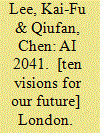

|
|
|
|
|
| Publication |
London, Penguin Random House, 2021.
|
| Description |
xxiii, 450p.pbk
|
| Standard Number |
9780753559017
|
|
|
|
|
|
|
|
|
|
|
|
Copies: C:1/I:0,R:0,Q:0
Circulation
| Accession# | Call# | Current Location | Status | Policy | Location |
| 060300 | 813.6/LEE 060300 | Main | On Shelf | General | |
|
|
|
|
| 2 |
ID:
161001
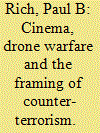

|
|
|
|
|
| Summary/Abstract |
The study of the cinematic representation is extremely useful in framing of counter-terrorism policies, whether in the US or elsewhere. This paper examines cinema’s interest in drone warfare as well as the lives and personalities of drone pilots. It argues that drone warfare suffers a considerable image problem that has been brought out in several recent features and it is unlikely that any major cinematic myth of drone warfare will easily develop, certainly in comparison to myths concerning special forces and special operations.
|
|
|
|
|
|
|
|
|
|
|
|
|
|
|
|
| 3 |
ID:
184136
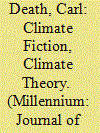

|
|
|
|
|
| Summary/Abstract |
The international politics of climate change invokes the imagination of various potential global futures, ranging from techno-optimist visions of ecological modernisation to apocalyptic nightmares of climate chaos. This article argues that most dominant framings of the future in climate policy imaginaries tend to be depoliticised and linear visions of universal, homogenous time, with little spatio-temporal or ecological plurality. This article aims to convince IR scholars of climate politics that Africanfuturist climate fiction novels can contribute to the decolonisation of climate politics through radically different socio-climatic imaginaries to those that dominate mainstream imaginations of climate futures. The Africanfuturist climate fiction novels of authors such as Nnedi Okorafor, Lauren Beukes and Doris Lessing imagine different spaces, temporalities, ecologies and politics. Reading them as climate theory, they offer the possibility of a more decolonised climate politics, in which issues of land and climate justice, loss and damage, extractive political economies and the racialised and gendered violence of capitalism are central.
|
|
|
|
|
|
|
|
|
|
|
|
|
|
|
|
| 4 |
ID:
103927
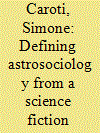

|
|
|
| 5 |
ID:
148049
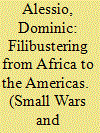

|
|
|
|
|
| Summary/Abstract |
This article looks at dominant definitions of empire, in particular those emphasizing large polities as the sole agents of imperial expansion. By doing so, it draws attention to the overlooked role of filibusters: private, non-state actors who initiate unauthorized military endeavours, either in an attempt to carve out empires for themselves or for their home state. It demonstrates that filibustering is not a practice unique only to the Americas or to the nineteenth century as so much of the literature suggests. Lastly, it scrutinizes the cultural and historical impact of the phenomenon. In terms of the former, it argues that filibustering had an important literary and filmic influence. Regarding the latter, it advocates that it frequently led to further violent intercessions in many of the countries occupied and influenced a particular style of proto-fascistic and charismatic militarism.
|
|
|
|
|
|
|
|
|
|
|
|
|
|
|
|
| 6 |
ID:
192197
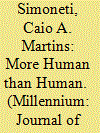

|
|
|
|
|
| Summary/Abstract |
Science fiction has often been associated with colonial imaginaries, given its engagement with themes such as invasions and encounters with other civilisations. This article addresses these relations by focusing on the invasion plot subgenre and the nexus between the modern subject and colonial frameworks. It argues that conceptions of subjectivity are a site of symbolic struggle, acting not only as the bases of the reproduction of colonial logics in these narratives, but also as a locus for their disruption. It first analyses Independence Day and War of the Worlds, highlighting how categories such as disembodiment, anthropocentrism and linear progress are crucial in reproducing the modern subject and colonial hierarchies in invasion stories. It then explores Arrival and Annihilation to argue that invasion plots can also present alternative forms of encounter as they disrupt modern subjectivity and colonial frameworks by contesting ideas of disembodiment, identity, progress and the human/nonhuman divide.
|
|
|
|
|
|
|
|
|
|
|
|
|
|
|
|
| 7 |
ID:
158304
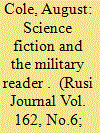

|
|
|
|
|
| Summary/Abstract |
The view that fiction belongs on modern military reading lists is becoming mainstream. One needs only to look at the titles on the reading lists put out by US Special Operations Command or the senior officers of the US Navy and US Marine Corps to see that it has a valued place in military professional development. And this is not limited to the Iliad and the Odyssey. Fiction, and specifically science fiction and future-war fiction, is becoming mainstream in Western militaries.
|
|
|
|
|
|
|
|
|
|
|
|
|
|
|
|
| 8 |
ID:
106802
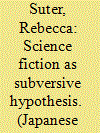

|
|
|
|
|
| Publication |
2011.
|
| Summary/Abstract |
The article considers the literary sub-genre of henkaku tantei sho-setsu, detective fiction that included supernatural or pseudo-scientific elements. Such stories were published regularly in the interwar entertainment magazine Shinseinen, but this was also a journal with an intellectually sophisticated and politically engaged side, regularly publishing essays on the relationship between science and literature, and reflecting the fluidity and constant change of the period in which it flourished. I look at henkaku tantei sho-setsu's combination of rationalism and fantasy, and its oscillation between enthusiasm and anxiety towards modern science, in order to reflect more broadly on Shinseinen's position between ideas of literature as pure diversion and arguments defending its social and educational function. To investigate the specific articulation of these dynamics, I then offer a close reading of one representative work published in the magazine in 1931, 'Robotto to beddo no ju-ryo-', [The Robot and the Weight of the Bed], by Naoki Sanju-go, one of the founding fathers of modern Japanese popular literature.
|
|
|
|
|
|
|
|
|
|
|
|
|
|
|
|
| 9 |
ID:
157147
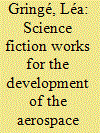

|
|
|
| 10 |
ID:
176255
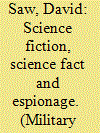

|
|
|
| 11 |
ID:
138593
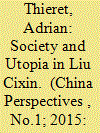

|
|
|
|
|
| Summary/Abstract |
This article examines utopianism in contemporary China through the short stories “Taking Care of God” and “Taking Care of Humans” by best-selling science fiction author Liu Cixin. It argues that these stories constitute an ethical resistance to the shortcomings of the capitalist world order into which China has merged during the reform period. Read as a continuation of the modern Chinese utopian tradition as well as a reaction to contemporary trends, these stories offer an articulation of hope that a more just social order can yet be achieved despite the seemingly intractable problems facing the world today.
|
|
|
|
|
|
|
|
|
|
|
|
|
|
|
|
| 12 |
ID:
157150
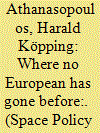

|
|
|
|
|
| Summary/Abstract |
This article is meant to begin an investigation into the role of Europe and European integration in science fiction. After a brief discussion of methodology, it reviews a number of key novels, films and bandes dessinées of science fiction and analyses their references to Europe and European integration. The references are placed into four categories: surveillance state, conspiracy theories, environmental disasters, and space exploration. References to European integration in this genre are rare and in the case of the first three categories they are dystopian. While this can partially be attributed to a general tendency within the genre towards dystopian storytelling, it is argued that the prevalence of dystopia can also be explained with reference to moral disorientation. A notable exception is made by references to European integration in space-based science fiction, where European integration is seen as contributing towards global collaboration. This representation of European integration provides an alternative outlook on the EU as a vision of global collaboration. Science fiction is arguably not only an important method to popularise space exploration, but also a method to rekindle the European project.
|
|
|
|
|
|
|
|
|
|
|
|
|
|
|
|
|
|
|
|
|